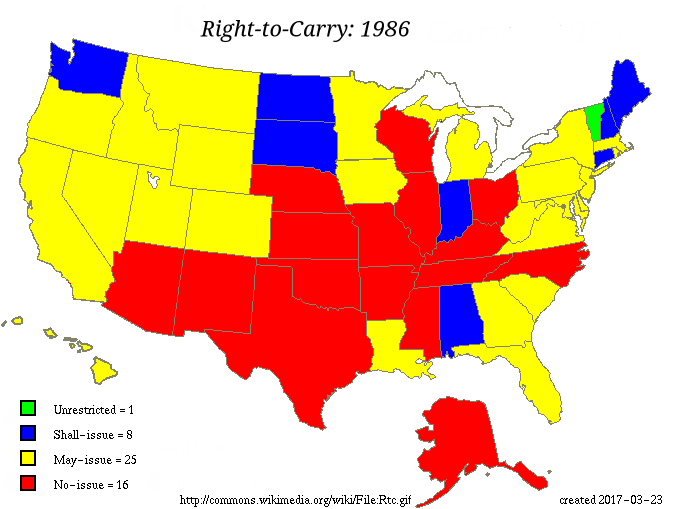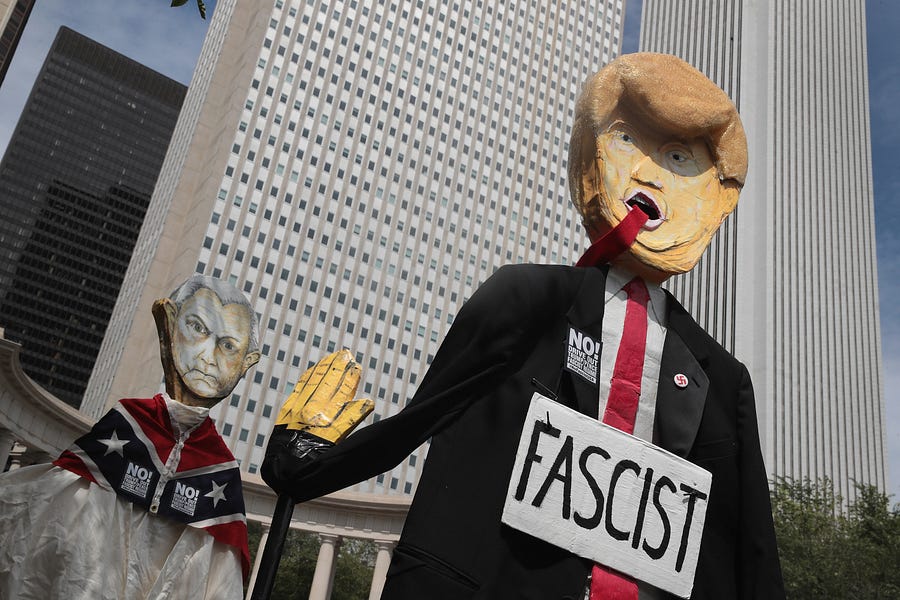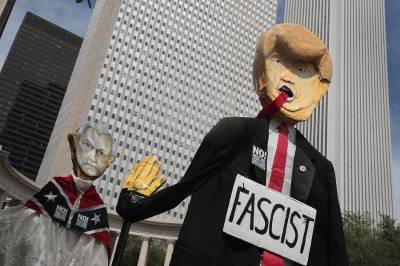Earlier today I read the most eye-catching sentence of the 2020 election so far. Writing in The Nation, Katha Pollitt declared, “I would vote for Joe Biden if he boiled babies and ate them.” Why is she so desperate? Because “taking back the White House is that important. Four more years of Trump will replace what remains of our democracy with unchecked rule by kleptocrats, fascists, religious fanatics, gun nuts, and know-nothings.”
As I read those words, I was transported back to April, and my debate over Evangelical support for Donald Trump with Christian author and radio host Eric Metaxas. He declared his own absolute commitment to voting for Trump and against Biden. At the end of our exchange he described his view of the stakes of the election (my response follows):
ERIC METAXAS: I simply don’t see how anything that has been said here or has been said would get me to allow someone like Joe Biden or a Hilary Clinton to genuinely destroy America forever[.]
DAVID FRENCH: “Wait wait a minute, you say [support for Trump] is not fear based, and yet you just said that Joe Biden will destroy America forever.”
ERIC METAXAS: “Correct, correct.”
Metaxas was particularly concerned that Biden would make America socialist. If I’d been more on my toes I would have noted that Biden beat a socialist in the Democratic primary in part by running against socialism. But alas, I thought of that retort only on the drive home.
Metaxas’s rhetoric should sound familiar. Remember 2016? Here is the opening of perhaps the single-most influential essay of the entire election cycle:
2016 is the Flight 93 election: charge the cockpit or you die. You may die anyway. You—or the leader of your party—may make it into the cockpit and not know how to fly or land the plane. There are no guarantees.
Except one: if you don’t try, death is certain. To compound the metaphor: a Hillary Clinton presidency is Russian Roulette with a semi-auto. With Trump, at least you can spin the cylinder and take your chances.
While there have always been those who declare that the fate of the nation hangs in the balance in any given election, I have not in my lifetime seen such a rise in the most urgent rhetoric. I’ve not seen so many ordinary folks read words like those above, and believe them, deeply.
There is a palpable sense among many of America’s most politically engaged citizens that our nation is slipping away. We may be crossing a tipping point. In fact that was the subtext (and sometimes the text) of last summer’s battle over “Frenchism.” If politics was now “war and enmity,” then my tactics—rooted in respect for pluralism, defense of civil liberties and civil engagement—were simply inadequate for the times.
I have friends and family members—people I love and respect—who would read Metaxas’s words and nod along. Yes, he gets it David. You do not. I have progressive friends who completely agree with Pollitt. Donald Trump is that big of a threat to American law and institutions.
Ever since I read the Flight 93 essay, I’ve been working hard to battle excessive alarmism. It’s not that I don’t believe the stakes are high or that elections are very important, but they’re not that high. Our constitutional republic isn’t that precarious.
If you name your chief fear or set of fears, and think about American governance systematically, you quickly realize the limits of presidential authority. No president can either end or permanently protect abortion rights. No president can implement socialism. The First Amendment doesn’t stand or fall based on the outcome of any single presidential election. In fact, many of our most fundamental religious and free speech rights don’t rest on precarious 5-4 majorities at all. Instead, they’re protected 9-0 or 7-2.
Moreover, electoral accountability comes quickly in our constitutional system. Trump had only two years of united Republican governance, and even then he was hampered by the filibuster. Barack Obama won a far more decisive victory in 2008 than Trump won in 2016, and he also enjoyed only two years with both houses of Congress in Democratic hands.
In addition to stating constitutional doctrines and the facts of American civics, I can throw giant piles of charts and graphs at conservative Americans to show that America is not, in fact, going to hell in a handbasket.
Abortion rates are in the midst of an almost 40-year decline, and the abortion rate is lower than it was when Roe was decided. Divorce rates have also been declining for 40 years. The percentage of children in intact families is increasing.
Are you a gun rights supporter, then watch this GIF—it represents one of the most stunning representations of a legal and political rout that I’ve ever seen:

Of course not everything has come up conservative. Far from it. Progressives have won their share of enduring legal and cultural victories. While the abortion rate goes down, the abortion right remains secure, and it would remain secure in progressive states even if Roe is overturned. Gay marriage is settled. The main threat to LGBT rights is less to their existence than to their continued expansion. Elite corporate America is not only quite progressive, it’s not at all shy about exerting its economic power to advance progressive norms.
In many ways, the very stability of each side’s cultural and political gains should turn down the political temperature. Neither Republicans nor Democrats are in as much peril as they imagine. Instead, the temperature only increases.
Consequently, even as I try to combat alarmism, I’m growing more alarmed— but not as much about the presidency of either Joe Biden or Donald Trump. I’m increasingly alarmed about alarmism itself. I’m alarmed about the health of a republic when an ever-larger number of people consider politics to be “war and enmity.”
To put the danger of alarmism in a Flight 93 context, imagine that you charge the cockpit and engage in mortal combat, only to find out—too late—that the plane was merely experiencing turbulence? Charging the cockpit wasn’t in fact your only hope. It was the wrongheaded path to destruction. In this formulation, the sense of “war and enmity” isn’t the response to a political emergency, it creates the emergency.
I’ve grown so alarmed by American enmity that I’ve written a book about it (shameless plug alert—it’s called Divided We Fall, and it comes out this September), and I want to highlight one small part of its argument. To help understand why slavery broke America in 1860—and not before—I took a close look at the role of sheer enmity, of fear and hatred, in national division.
Abraham Lincoln wasn’t going to end slavery prior to the Civil War. And while the extent of slave power was at stake in the election of 1860, the institution of slavery itself was not. Lincoln’s election, however, wasn’t the only important factor in the timing of secession. We can’t think clearly about timing without remembering John Brown’s raid on Harpers Ferry. When Brown briefly seized the federal arsenal, he intended to launch a mass-scale violent slave rebellion. He never had a chance.
But when Northern abolitionists treated Brown as a noble martyr in a righteous cause, Southerners reacted with extraordinary anger. In his definitive one-volume history of the Civil War, Battle Cry of Freedom, James McPherson vividly describes northern respect for Brown and Southern rage. He says Southerners were cast into “unreasoning fury” and perceived “only that millions of Yankees seemed to approve of a murderer who had tried to set the slaves at their throats.”
Indeed, if you read the articles of secession of Southern states, in addition to their defenses of slavery, you time and again also read that they believe that Northerners are trying to incite violent insurrection. Texas’s secession declaration even accuses abolitionists of seeking to poison innocent Texans. It says abolitionists “hired emissaries among us to burn our towns and distribute arms and poison to our slaves.”
America’s greatest crisis was brought about by the combination of its most consequential moral, cultural, and political dispute and the sheer fury of the seceding states. That’s one reason why I say that rage creates its own risks.
One of the central challenges of any politician, pastor, or pundit isn’t just to explain which side of an issue they’re on but also to explain its relative importance. Not every problem is serious, and not every serious problem is a crisis. Moreover, there is also an obligation to truly understand not just the position but also the intentions of those you oppose. It’s our moral and civic responsibility to treat those opponents with decency and respect.
America faces enduring challenges, but it possesses a remarkably resilient system of government. It has the capacity to absorb an immense diversity of viewpoints, channel disagreements through a federalist system that allows for cultural variation and political diversity, and it’s resistant to truly seismic change in the absence of political consensus.
So, no, the fate of the republic is not at stake in 2020—not unless we let our own emotions run out of control. A nation can endure and even prosper through profound disagreement, but the most robust of republics struggles to survive in the face of fear and hate.
One last thing ...
I try hard to respond to reader mail, but the volume is sometimes overwhelming. I do, however, read everything you write. One way to guarantee that you’ll eventually get a lengthy response is to take issue with one of my opinions about science fiction, superheroes, or military history.
A podcast listener (a Marine officer) took issue with my assessment that U.S. Grant engaged in “brutal” tactics as part of his war against Lee in the East. That launched a vigorous and fun exchange that brought back to mind the Overland Campaign—six of the most important (and bloodiest) weeks in all of American history. Have you forgotten that series of battles? Watch and remember:
Photograph by Scott Olson/Getty Images.







Please note that we at The Dispatch hold ourselves, our work, and our commenters to a higher standard than other places on the internet. We welcome comments that foster genuine debate or discussion—including comments critical of us or our work—but responses that include ad hominem attacks on fellow Dispatch members or are intended to stoke fear and anger may be moderated.
With your membership, you only have the ability to comment on The Morning Dispatch articles. Consider upgrading to join the conversation everywhere.